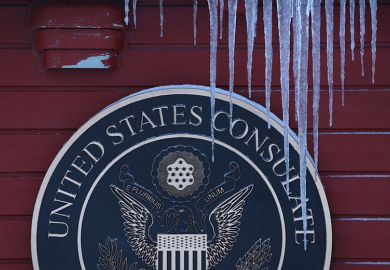Top universities are asking for delays and further funding concessions to be built into England’s incoming international student fee levy after appearing to lose the fight on whether the controversial policy should happen at all.
Universities are awaiting more details from the government on its plans to take a cut of overseas earnings, with next month’s budget seen as a key point in the development of the policy.
Lobbying has shifted from trying to shut down the idea entirely to trying to lessen its impact after ministers pledged to use some of the proceeds to fund the reintroduction of maintenance grants, seen as a way of securing public support for the idea.
Robin Mason, pro vice-chancellor (international) at the University of Birmingham, told Times Higher Education that the levy was now “inevitable” but the details “really matter”.
“For example, a flat charge is far better than a percentage,” he continued. “A percentage penalises the universities who, as a result of being higher quality and ranked, are able to charge more. A flat charge per student does not have that effect.”
He continued: “A lot of the debate is about the uncertain effect on demand of the levy. I suspect this won’t happen but a commitment to reviewing the effect of the levy after two years, say, with the possibility of changing the level and nature of the levy would be welcome.”
Vice-chancellors have long argued that the levy will push them into further financial difficulties, with more job cuts and fewer places for domestic students likely knock-on impacts.
An immediate priority will be to ensure the levy does not apply in the academic year 2026-27, given recruitment has already started, and fees have already been set.
Another option under discussion is reducing the percentage taken from the current 6 per cent to closer to 1 or 2 per cent, although this could prove politically difficult if it reduced the amount available for disadvantaged students. The government has not yet said what proportion of the levy money will be spent on the new grants.
Leaders also hope they might be able to have more of a say over how the money is spent and secure ring-fenced pots for certain activities or types of institutions or courses.
In its budget submission, Tim Bradshaw, chief executive of the Russell Group, asked the chancellor to consider a “wider financial settlement for research-intensive universities” that would help mitigate the levy’s impact.
This was published before the recent skills White Paper set out plans to automatically raise university tuition fees with inflation and look at the cost recovery of research.
Hollie Chandler, director of policy at the Russell Group, told Times Higher Education that it was “encouraging” to see these commitments as “a helpful first step in putting the sector on a more financially sustainable footing”.
“But while it will hopefully prevent further erosion in the fee value and help with financial planning, it will not reverse the deficits which have accumulated in recent years as fees and grants have failed to match inflation,” she continued. “A 6 per cent levy will exacerbate these financial pressures, taking at least £300 million a year out of English Russell Group universities.”
Speaking to Parliament’s education select committee in October, Vivienne Stern, chief executive of Universities UK, said the levy will “completely undermine the benefit, plus some, of the government’s decision to raise tuition fees in line with inflation”.
The Russell Group also asked the government to delay announcing the policy details in the budget and instead take more time to consult with the sector and consider ongoing research commissioned by the Department for Education on international student price sensitivity.
“The government has made its intention to introduce the levy clear. We’re calling for them to avoid setting out any detailed proposals at the upcoming budget while they properly assess the likely impact, and we’ll continue to evidence the damage it could cause for universities, students and our local and national economies,” said Chandler.
Universities have repeatedly said that they will be unable to pass the whole cost on to international students, leaving them with little choice but to absorb it.
Chandler added: “Our universities, like all those across the sector, are already making efficiencies where they can to mitigate the existing financial challenges.
“But efficiencies can only go so far – if the levy is implemented, universities would be forced to make savings elsewhere, for example diverting funds away from valuable research and development, and teaching of UK students.”
Register to continue
Why register?
- Registration is free and only takes a moment
- Once registered, you can read 3 articles a month
- Sign up for our newsletter
Subscribe
Or subscribe for unlimited access to:
- Unlimited access to news, views, insights & reviews
- Digital editions
- Digital access to THE’s university and college rankings analysis
Already registered or a current subscriber?








